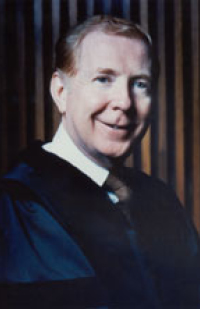Former Justice Andy Douglas Passes Away

Former Justice Andy Douglas served three terms on the Supreme Court of Ohio.

Former Justice Andy Douglas served three terms on the Supreme Court of Ohio.
Former Justice Andy Douglas, the 139th justice of the Ohio Supreme Court, passed away today at age 89. Justice Douglas served three terms on the Court, from 1985 to 2002.
“An active Ohio attorney until the end, Justice Douglas was a hard-working jurist with a tireless legal mind,” Chief Justice Maureen O’Connor said. “Today is a sad day, as we lost a compassionate human being, who loved the law and loved helping others.”
Justice Douglas was born in 1932 in Toledo. He attended the University of Toledo, where he earned his law degree in 1959. From 1954 to 1956, he served in the U.S. Army Infantry and Signal Corps and obtained the rank of first lieutenant.
In 1960, Justice Douglas co-founded the law firm Winchester & Douglas. He practiced law in Lucas County for 20 years. In 1961, at age 29, he became one of the youngest members elected to Toledo City Council. He was re-elected nine times, serving until 1980. He went on to be elected to the Ohio Sixth District Court of Appeals.
In early 2019, Justice Douglas sat for a video interview with current Justice Patrick F. Fischer for a series called “Reflections from the Bench.” Justice Fischer talked with Justice Douglas about his early life as a member of an immigrant family from Scotland living in a poor section of Toledo, as well his years on the Supreme Court.
In that interview, Justice Douglas talked about hearing all four DeRolph cases challenging the constitutionality of how Ohio funds public schools, as well as being the only member of the Supreme Court who was among the majority ruling in each of the four decisions.
“I came from a public school,” Justice Douglas explained. “I knew that the educational opportunities were determined by a child’s ZIP code, as opposed to the fact that they should have had an equal education.”
“That case came to us in 1997 for the first time,” he said. “There were 11,000 pages in that record, and I went through every page and all the depositions, because in addition to everything else, it was fascinating.”
Justice Fischer, too, asked Justice Douglas about his propensity to mentor his judicial law clerks. Justice Douglas answered with tears in his eyes. “I owed that to them,” he said. “They were young lawyers eager to learn. It was my job to teach.”
“Those are my happiest days on the Court,” he said. “When you could bring bright young minds together and listen to what they had to say.”
As to how he would be remembered, Justice Douglas told Justice Fischer in the interview that he hoped his legacy would be: “That everybody that had the need or the occasion to invoke the need of my service got a fair shake. My heart is that those who really needed help knew where to come and were assured that at least they would be fairly heard.”
Justice Douglas could not run for a fourth term, as he reached the mandatory retirement age of 70 in 2002. He retired Dec. 31, 2002, and joined the Columbus law firm Crabbe, Brown & James as a partner. He also served as executive director of the Ohio Civil Service Employees Association (OCSEA.) Most recently, Justice Douglas served of counsel with Columbus law firm Mazanec, Raskin & Ryder Co., LPA.
He is survived by his wife, Sue, as well as his four children. His first wife, Joan, died in 1966.


